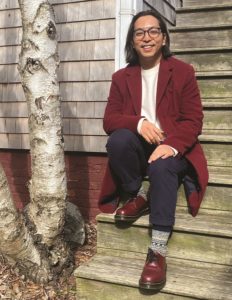“They came unarmed. They came/ half-masked. They came/ before the crow. They came/ with the moon. They came/ moonless. They came/ out of rain. They came/ as their enemy. They came/ smiling.”
These are first lines of “No Rhododendron” by the Nepalese poet Samyak Shertok. The poem is about the bloody civil war that raged in Nepal between Maoist rebels and the government from 1996 to 2006, the formative years of Shertok’s youth.

During his time as a fellow at the Fine Arts Work Center in Provincetown, Shertok is working on a poetry collection with the same title. “The rhododendron is Nepal’s national flower,” he says. “My manuscript is all about Nepal and what it means to have and lose a home.”
The use of the pronoun “they” in the poem is purposefully not assigned to any particular warring party. “The Maoist conflict was very complicated and wrong from both sides,” Shertok says. “I’m only interested in giving voice to the innocents who suffered the most: the farmers and teachers, the parents and children, those whose families were massacred. I couldn’t care less about political ideology.”
While Shertok’s own family was not persecuted during the civil war, the conflict affected his development as a writer. “When I was in the eighth grade, I wrote a short story for a contest in a magazine and won first prize,” Shertok says. “My story wasn’t about either side, but there was a reference to the protagonist’s father being killed. The next day my parents came to my bedroom and told me to be careful about what I write. They were worried that someone would come for me. This fear seeping into a family is something you carry with you all your life.”
Shertok came to the U.S. for his undergraduate degree, then got an M.F.A in fiction from Arizona State University and an M.F.A. in poetry from the University of Mississippi. He is now completing a Ph.D. in creative writing at the University of Utah. When asked how long he has been away from his home in Nepal, he answers simply, “Too long.”
Shertok grew up in a small village with just 20 households, called Falam Sanghu, on the bank of the Mikli-Phoom River in the district of Sindhupalchok. “Rice terraces surrounded our house,” he recalls. “Two orange trees flanked the entrance. Devoid of technology, Falam Sanghu, for me, is an idyll and perhaps the only place I can call home so far.”
When Shertok was 10, his parents — themselves barely literate — moved the family to Nepal’s capital, Kathmandu, to secure a better education for their children. “I’ll always remember my childhood in the city as a feverish dream,” he says. “It was a very rough transition.”
Giving voice to those who suffer has been a theme in Shertok’s work. In 2014, he wrote poetry as “healing medicine” for cancer patients at the Mayo Clinic, then founded the project Healing Through Poetry: Nepal Earthquake Relief in 2015.
“The metaphor I’ve used in the past is that I am the flute, while the breath is theirs, and the song is also theirs,” says Shertok. “As the poet, I’m simply taking the breath and trying to let it go through me as effortlessly as possible, with very few interventions, if you will, while trying to give some shape, some kind of flow.”
Quoting W.S. Merwin, who said that “poetry begins and ends with listening,” Shertok adds, “I believe that every great poem is meant to be heard. When your tongue is involved, your throat is involved, and your own breath is involved, then you will also notice the breath of the poem.”
Shertok’s poems focus as much on his own emotions, being far from home, as they do on the suffering of the Nepalese people during the civil war. “The threads in my manuscript are all interwoven and interconnected,” he explains. “I’m asking: What do we mean by home? What happens to a person’s sense of home after a long period of absence? And how can you write about your home in a language that is not yours?”
Shertok’s native language is Tamang, which is spoken by around five percent of Nepal’s population. It is one of the country’s 123 languages, most of which are exclusively oral. “I’m exploring what it is like to write from a distance about a mother tongue that does not have a script, which is even trickier because an oral language evolves over time,” says Shertok. “When you return home, the mother tongue you grew up with can feel like a different language altogether.
“Lately, I’ve been thinking about how the form of a poem can become like a home for a poet in exile,” continues Shertok. “I’m more aware now of using Western forms. For example, I have a sonnet sequence in my manuscript, but I realized somehow that didn’t quite sit right with me. So, I shifted the sequence to read from the bottom to the top, earth to sky, honoring the tradition of a sky burial.”
When asked to define “home,” Shertok says, “It’s the feeling that a place recognizes me. I love the sea here in Provincetown, but I have never felt that the sea knows me. That sums up what home is to me: that silent communion that you feel with a place, that understanding of one another.”
Home Truth
The event: A reading by Fine Arts Work Center writing fellows Samyak Shertok and Molly Anders
The time: Saturday, April 2 at 7 p.m.
The place: Stanley Kunitz Room, Fine Arts Work Center, 24 Pearl St., Provincetown; or online at fawc.org
The cost: Free



